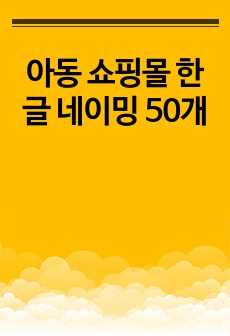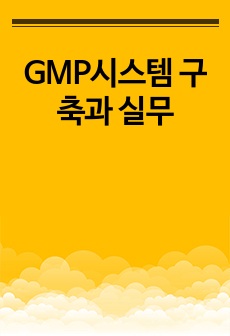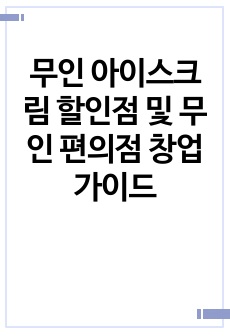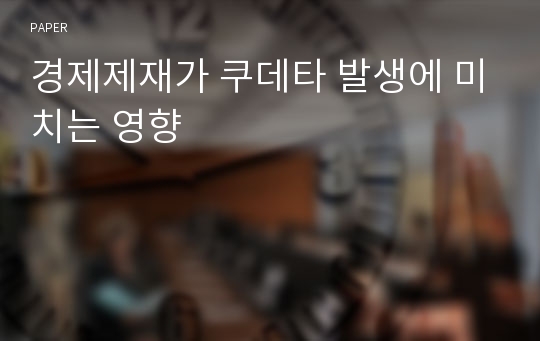목차
1. 문제 제기2. 기존문헌 검토
3. 주장
4. 메커니즘
1) 포괄적 제재
2) 선택적 제재
5. 연구 디자인
6. 사례 연구
7. 결론
참고문헌
본문내용
1. 문제 제기본 연구는 경제적 관점에서 쿠데타(coup d'état)발발을 설명하는 기존 연구들을 검토하고 대안적 설명을 제시하고자 한다. “왜 쿠데타가 발생하는가?”라는 질문에 대한 여러 갈래의 설명들이 존재한다. 특히 쿠데타 연구에 있어서 경제적 원인에 초점을 맞춘 문헌들은 중요한 대답을 제시하였다. 여러 연구들에서 경제적 쇠퇴, 침체, 불안정과 같이 다양한 용어로 표현되지만, 공통적으로 주장하는 바는 GDP가 낮은 국가일수록 쿠데타가 더욱 빈번하게 발생한다는 것이다(Londregan and Poole, 1990; Nam Kyu Kim, 2014; Singh, 2014). 국가의 군비 지출과 쿠데타 발발 간의 관계에 주목한 연구들도 있다. 군비 지출 증가 혹은 감소가 쿠데타 발발에 미치는 영향은 논쟁적이다(Collier and Hoeffler, 2005; Leon, 2014; Powell, 2012). 한편 쿠데타가 지배연합 내부 엘리트들에 의한 이익 추구의 결과라는 주장도 제시되었다(Bueno De Mesquita et al, 2003).
기존 연구들은 주로 국가 내부의 경제적 동학에 초점을 맞추는 경향이 있다. 이와 달리 외부로부터의 경제적 충격과 쿠데타 발생 간의 관계를 설명하려는 시도는 많지 않았다. O'Kane(1993)은 수출의존적인 국가가 수출이 불안정한 상황에 직면하였을 때 쿠데타가 발생할 것이라고 주장하였다. 그러나 수출 불안정이 구체적으로 어떤 상황 하에서 발생하는지에 대해서는 고려하지 않았다. 본 연구는 국가 경제에 영향을 미칠 수 있는 외부적 충격으로 경제 제재(Economic Sanctions)를 상정한다. 경제 제재는 국가가 선택할 수 있는 주요한 대외정책 수단의 하나이며, 냉전 종식 이후 더욱더 빈번하게 사용되고 있다. . “경제 제재라는 외부적 충격이 가해졌을 때 쿠데타 발생 가능성은 어떻게 변화할 것 인가?” 라는 질문에 아직 대답이 제시되지 않았다. 따라서 대안적 독립변수인 경제 제재를 중심으로 쿠데타 발생이라는 종속변수를 설명하고자 한다.
참고 자료
Askari, Hossein G., John Forrer, HildyTeegen and Jiawen Yang, Economic Sanctions: Examining Their Philosophy and Efficacy (London: Praeger, 2003).Bueno De Mesquita, Bruce, Alastair Smith, Randolph M. Siverson and James D. Morrow, The Logic of Political Survival (Cambridge, MA: MIT Press, 2003).
Byman, Daniel and Jennifer Lind, “Pyongyang’s Survival Strategy: Tools of Authoritarian Control in North Korea”, International Security, 35-1(2010), pp. 44-74.
Collier, P., and AnkeHoeffler, "Greed and grievance in civil wars", Working Paper WPS 2000-18(2000), World Bank, Washington, DC.
Collier.“Coup traps: why does Africa have so many coups d’etat?,”(2005), Unpublished manuscript.
Cortright, David and George A. Lopez, “Introduction: Assessing Smart Sanctions: Lessons from the 1990s”, In Smart Sanctions: Targeting Economic Statecraft, edited by David Cortright and George A. Lopez (Plymouth: Rowman and Littlefield, 2002).
Cortright, David, Alistair Millar and George A. Lopez, “Smart Sanctions in Iraq: Policy Options”, In Smart Sanctions: Targeting Economic Statecraft, edited by David Cortright and George A. Lopez (Plymouth: Rowman and Littlefield, 2002).
Drezner, Daniel W., “An Analytically Eclectic Approach to Sanctions and Non-proliferation”, In Sanctions, Statecraft and Nuclear Proliferation, edited by Etel Solingen (Cambridge: Cambridge University Press, 2012).
Jones, Lee, Societies Under Siege: Exploring How International Economic Sanctions (Do Not) Work (Oxford: Oxford University Press, 2015).
Kalyvas, Stathis N., The Logic of Violence in Civil war (New York: Cambridge University Press, 2006).
Kim, NamKyu, “Revisiting Economic Shocks and Coups”, Journal of Conflict Resolution, 60-1(2016), pp. 3-31.
Leon, Gabriel, “Loyalty for sale? Military spending and coups d’etat,” Public Choice 159(2014), pp. 363-383.
Lektzian, David and Mark Souva, “An Institutional Theory of Sanctions Onset and Success”, Journal of Conflict Resolution, 51-6(2007), pp. 848-71.
Londregan, John B., Keith T. Poole, “Poverty, the Coup Trap, and the Seizure of Executive Power,” World Politics, 42-2(1990), pp.151-183.
Major, Solomon and Anthony J. McGann, “Caught in the Crossfire: “Innocent Bystanders” as Optimal Targets of Economic Sanctions,” Journal of Conflict Resolution, 49-3(2005), pp. 337-359.
Ninic, Miroslav, “Getting What You Want: Positive Inducements in International Relations”, International Security, 35-1(2010), pp. 138-183.
O’Kane, Rosemary H. T., “Coups d’Etat in Africa: A Political Economy Approach,” Journal of Peace Research, 30(1993), pp. 251-270.
Pape, Robert, Bombing to Win: Air Power and Coercion in War (Ithaca: Cambridge University Press, 1996).
Pape. “Why Economic Sanctions Do Not Work”, International Security, 22-2(1997), pp. 90-110.
Powell, Jonathan, “Determinants of the Attempting and Outcome of Coups d'état,” Journal of Conflict Resolution, 56-6(2012), pp. 1017-1040.
Raleigh, Clionadh, Hyun Jin Choi and Dominic Kniveton, “The devil is in the details: An investigation of the relationships between conflict, food price and climate across Africa”, Global Environmental Change, 32(2015), pp. 187-199.
Reynolds, Celia L. and Wilfred T. Wan, “Empirical trends in sanctions and positive introductions in nonproliferation”, In Sanctions, Statecraft and Nuclear Proliferation, edited by Etel Solingen (Cambridge: Cambridge University Press, 2012).
Singh Naunihal, Seizing Power: The Strategic Logic of Military Coups (Maryland: Johns Hopkins University Press, 2014).
Svolik, Milan, The Politics of Authoritarian Rule (New York: Cambridge University Press, 2012).
Tostensen, Arne and Beate Bull, “Are Smart Sanctions Feasible?”,World Politics, 54-3(2002), pp. 373-403.
Weeks, Jessica L. P., Dictators at War and Peace (Ithaca and London: Cornell University Press, 2014).


























